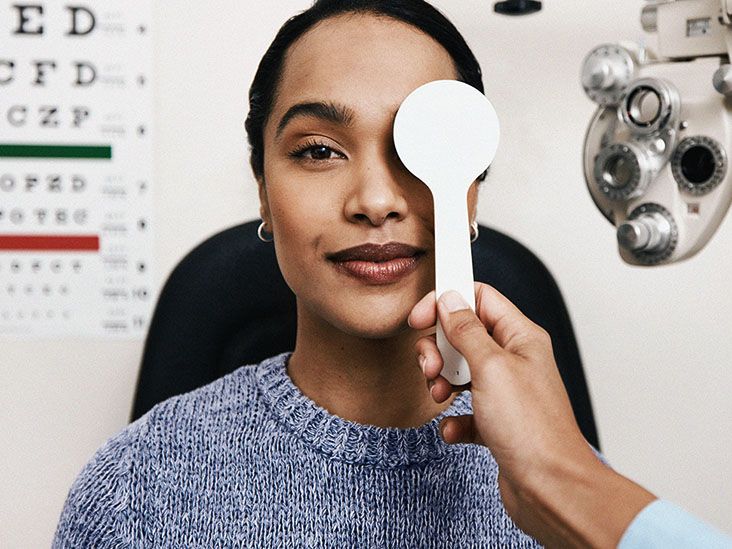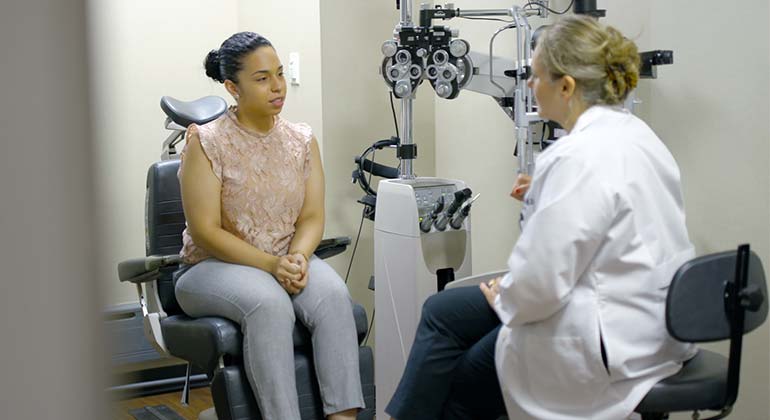The Significance of Routine Eye Examinations: Insights From a Seasoned Eye Doctor
Regular eye exams act as a crucial component of healthcare that extends beyond mere vision adjustment. A knowledgeable ophthalmologist can provide insights right into just how these assessments not just identify common eye conditions however likewise reveal underlying health and wellness problems that may or else go unnoticed. The quiet development of diseases such as glaucoma and macular degeneration highlights the need of early discovery. Understanding the frequency and relevance of these evaluations can inevitably influence one's long-term health trajectory, raising the concern of just how often individuals should prioritize their eye health in the context of overall health.
Benefits of Normal Eye Examinations
Although numerous people may forget the relevance of routine eye exams, these analyses play a critical function in maintaining total health and wellness. Regular eye evaluations offer not just to examine vision however also to discover very early indicators of systemic wellness issues, including diabetic issues and high blood pressure. By identifying these conditions at their creation, individuals can obtain prompt treatments, considerably enhancing lasting end results.
In addition, eye exams can help in keeping track of existing health and wellness concerns, ensuring that any modifications in vision or eye health and wellness are immediately resolved (optometrist). The analyses permit customized suggestions relating to eyeglasses, way of life changes, and safety measures against potential eye stress or damages
Beyond physical wellness, the benefits of routine eye examinations prolong to enhancing quality of life. Inevitably, focusing on eye examinations promotes a proactive approach to wellness administration, equipping individuals to take charge of their well-being.
Common Eye Issues Detected
Routine eye exams contribute in detecting a variety of typical eye conditions that can dramatically influence vision and general health. Among one of the most widespread conditions recognized throughout these assessments are refractive errors, consisting of nearsightedness (nearsightedness), hyperopia (farsightedness), and astigmatism. These problems commonly materialize as blurred vision and can be quickly remedied with prescription glasses or get in touch with lenses.
Another common problem is glaucoma, a team of eye conditions that damage the optic nerve, usually linked to boosted intraocular stress. Early detection is vital as it can prevent permanent vision loss.
Age-related macular deterioration (AMD) is one more significant problem that affects main vision, particularly in people over 50. Ultimately, diabetic retinopathy, a complication of diabetes, can cause extreme vision problems if not kept track of routinely. Through detailed eye tests, these conditions can be identified early, enabling prompt monitoring and therapy to preserve vision and boost lifestyle.
Importance of Early Discovery
Very early detection of eye problems plays an essential function in maintaining vision and protecting against considerable health difficulties. Lots of eye illness, such as glaucoma, diabetic person retinopathy, and age-related macular deterioration, can progress calmly without visible signs and symptoms in their beginning. By the time signs and symptoms manifest, irreparable damages may have taken place, bring about long-term vision loss.
Regular eye examinations help with very early medical diagnosis, enabling prompt intervention and therapy. As an example, treating raised intraocular pressure can prevent the beginning of glaucoma, while managing blood sugar level levels can considerably reduce the threat of diabetic retinopathy. Additionally, problems like cataracts can be successfully managed with medical intervention when recognized early.

Exactly How Usually Should You Go To?
Establishing the frequency of eye exams is crucial for preserving optimum eye health and wellness and vision. The basic suggestion for grownups is to have a comprehensive eye examination every one to two years, depending upon specific risk aspects and age. For people aged 18 to 60, an examination every 2 years is commonly sufficient if no vision issues exist. Nevertheless, those over 60 must take into consideration yearly tests, as the threat of age-related conditions increases dramatically.
Individuals with details threat variables, such as a family members background of eye condition, diabetes see this here mellitus, or existing vision troubles, may require more frequent analyses. Youngsters must have their first eye exam at 6 months of age, adhered to by extra exams at age 3 and prior to going into school. Regular check-ups throughout youth are important as vision can alter quickly during developmental years.
Inevitably, the frequency of visits need to be customized to every individual's circumstances, including way of living, work hazards, and any pre-existing eye problems. Consulting with an eye care expert can offer tailored suggestions, making certain that your eye health and wellness is frequently kept track of and maintained.
Tips for Your Eye Test
Preparing for your eye examination can enhance the efficiency of the browse through and guarantee a detailed assessment of your eye wellness. To maximize your time with the eye doctor, it is vital to gather relevant info before your consultation. Start by putting together a checklist of any kind why not try here of medications you are currently taking, including non-prescription drugs and supplements, as these can impact eye health and wellness.
In addition, record any kind of symptoms you have experienced, such as blurred vision, discomfort, or migraines. This info will certainly aid your eye medical professional in diagnosing prospective problems. If you use glasses or get in touch with lenses, bring them along, also if you do not use them routinely. This will assist the physician examine any kind of changes in your vision.
It is likewise helpful to have a family members background of eye problems available, as genetic elements can contribute to your eye wellness. Ultimately, take into consideration arranging your test for a while when you are much less hurried, enabling you to ask concerns and discuss your worries extensively. By preparing appropriately, you make certain that your eye test is effective which your eye physician has all the essential information to give the ideal treatment feasible.

Conclusion
Regular eye exams play a critical role in maintaining both vision and overall wellness. They assist in the very early detection of various eye problems and systemic concerns, enabling for timely treatment. The referrals for regularity highlight the relevance of positive treatment. Carrying out easy primary ideas can enhance the examination experience. Ultimately, focusing on extensive eye evaluations adds dramatically to article source the conservation of vision and the enhancement of lifestyle, underscoring the requirement of routine eye treatment in precautionary medical care methods.
Regular eye examinations are important in detecting a selection of typical eye conditions that can dramatically affect vision and general health.Establishing the frequency of eye tests is vital for keeping optimal eye wellness and vision.Preparing for your eye exam can improve the performance of the visit and make sure a comprehensive analysis of your eye health (optometrist). By preparing sufficiently, you ensure that your eye test is productive and that your eye doctor has all the needed details to provide the best care feasible
Eventually, focusing on thorough eye analyses adds dramatically to the preservation of vision and the improvement of top quality of life, underlining the requirement of routine eye care in preventive healthcare strategies.